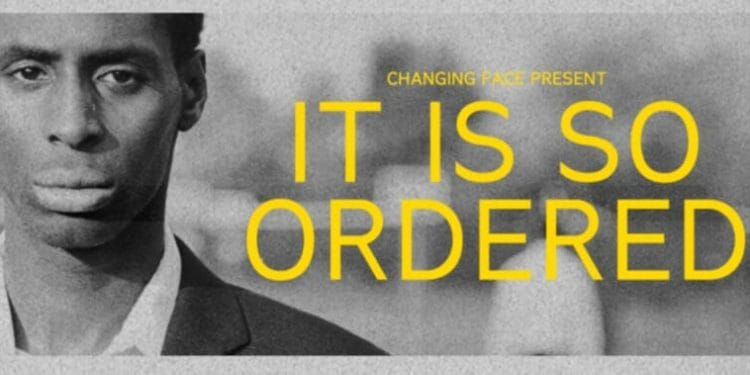
Appalling injustice, which reaches blood boiling levels, is the overarching theme in Conor Carroll’s It Is So Ordered, playing at the Pleasance Theatre and directed by Lucy Curtis. Inspired by true events, this is a cleverly played out two-hander that exposes deep-rooted racial tensions spanning more than five decades.
On the night of the 1964 Harlem race riots a man is killed on the streets, two young bothers are falsely accused of the crime and are promptly and brutally arrested. With evidence lacking, the police coerce a teenage boy, Bobby, in to testifying against the pair. Whilst one takes a deal and is eventually released, the other, Johnny, faces a life behind bars. Just as Bobby has watched the twin towers erected, Johnny sees them fall from a television set in his cell; this line in the play is particularly harrowing as it highlights how long this has really played out. Yet it’s not just Johnny who is imprisoned, Bobby is crippled by the guilt of what he has done, affecting his everyday life for many years, helped only by his pastor and religion.
Simon Mokhele and Faaiz Mbeliz are filled with a frenetic energy as they portray these two young men. From the outset, they dash around the stage, which is completely bare save for a couple of wooden boxes and chalk drawings they contribute to as the play progresses. In the scene where the riots break out there is real fear, and perhaps a little wonderment, in their faces as they describe the situation. For the main, they stay in their own character, but occasionally take on lines from other people, this can be a little confusing in the first ten minutes or so, before the characters have been fully established.
What stands out is the way the piece has been cleverly written, the two actors are essentially acting out their own plays, it’s not immediately noticeable but they barely interact with each other, instead they tell their own stories, which are of course interlinked and occasionally cross over. The result is rather like watching a tennis match, your head rotating back and forth to catch the next volley, the plot is as gripping as any grand slam final.
This is a deeply emotional play, which highlights these terrible injustices which were all too common of the time. What really hits home is how lives have been wasted and the consequences are still being felt today, sitting in the audience you ask yourself why nothing has been done, why there is forgiveness if not necessarily redemption. It Is So Ordered captures a moment in history and places it under the microscope for the much closer examination it deserves.

















